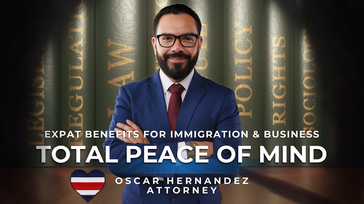The Legal Side of Costa Rica
Featuring Articles Written by Oscar Hernandez, Attorney
Oscar Hernandez is an Immigration Attorney
Located in San Jose, Costa Rica. He & His Team at
Expat Legal Advisors understand the needs
of the Expat who has begun a NEW LIFE in Costa Rica.
They know that the best way to enjoy the Pura Vida Lifestyle is to
have complete knowledge of the Laws of the Land. .
Understanding the Law & Living the Dream. .
Living the Pura Vida lifestyle in Costa Rica means more than enjoying its beaches, jungles and peaceful rhythm.
It means embracing a new way of life built on respect, knowledge and connection.
At Expat Legal Advisors, we believe that the more you understand the laws of the land,
the more fully and confidently you can enjoy the beauty of your new home.
These insightful articles, written by Attorney Oscar Hernández, who practices law in San José,
are designed to guide you through the legal landscape of Costa Rica with clarity and purpose.
From legal residency & real estate to healthcare & daily living, Oscar’s experience and dedication help demystify complex legal topics, empowering expats to make informed decisions
and live freely within the framework of Costa Rican law.
Knowledge is Peace of Mind. . and Peace of Mind is Pura Vida. .
Here, you’ll find practical wisdom, trusted guidance and the tools to help you thrive
as a well-informed member of Costa Rica’s expat community.
Enjoy this Article
Written Especially
for You. .
As in many other jurisdictions, one of the available pathways to obtain lawful residency in Costa Rica is through investment—either by acquiring real estate or by purchasing certain qualifying assets. For the purposes of this analysis, we will focus specifically on real estate acquisitions. Thanks to the tax incentives established under the Ley para la Atracción de Inversionistas, Rentistas y Pensionados (Law No. 9996), this option has become particularly appealing. It not only allows foreign nationals to obtain legal residency in the country but also grants a series of special tax exemptions derived from the recognition of the Investor immigration category. Among these benefits are the tax-exempt importation of up to two motor vehicles, duty-free importation of household goods, a 20% exemption from the Real Estate Transfer Tax, and exemption from import duties on professional or scientific instruments or materials necessary for the resident’s occupation. It is important to consider that all such tax benefits remain in force until July 14, 2026, unless an extension is enacted by the Legislative Assembly.
A common practice among foreign investors in Costa Rica is to avoid registering real property under their individual names. Instead, they often incorporate a business entity—typically a Sociedad Anónima (S.A.) or Sociedad de Responsabilidad Limitada (S.R.L.)—to hold title to the property. This strategy may serve purposes of asset protection, tax planning, or personal privacy, yet it directly affects how residency is processed since the investment requirement is assessed based on ownership of the asset.
To qualify for Investor Residency based on the purchase of real property, the property must be registered in the applicant’s personal name. Consequently, real estate titled in the name of a corporate entity will not be accepted under any circumstance. This necessitates alternative means to substantiate the investment to comply with immigration regulations. Because many foreign investors channel their funds through a corporation of which they are shareholders or quota holders, the valid alternative is to evidence the investment through ownership of corporate participation interests or shares valued at no less than USD $150,000. Proof of investment must include (1) a notarized certificate of corporate representation and share capital, issued based on the corporation’s legal books, confirming ownership of at least USD $150,000 (or its equivalent in Costa Rican colones at the official Central Bank rate) within 30 days before filing the residency application; and (2) a certification from a Certified Public Accountant (CPA) attesting to the effective investment of the required amount. The corporation must also be active and registered with the Ministry of Finance (Ministerio de Hacienda), as inactive entities do not qualify for this residency category.
When a corporate structure such as an S.R.L. is used, specific tax implications arise, particularly if the shareholder or manager is not domiciled in Costa Rica. Under Costa Rica’s territorial tax system, income derived from goods, capital, or services utilized within Costa Rican territory is taxable. If the S.R.L. engages in business activities in Costa Rica or is deemed to have a permanent establishment, its profits are subject to the Corporate Income Tax on Costa Rican-source earnings. Additionally, payments made to non-residents may be subject to the Impuesto sobre las Remesas al Exterior (ISRE), or Tax on Remittances Abroad. The 2.5% withholding often referenced relates to the Real Estate Transfer Tax withholding applied when the seller is a non-resident individual or entity.
Structuring property ownership through an S.R.L. may provide strategic advantages. For instance, a future sale of the property can be executed through the transfer of corporate ownership interests rather than by selling the real estate itself. Depending on the ownership structure and domicile of shareholders, this may lead to different tax treatment compared to a direct sale of the property—though such transactions remain subject to Costa Rican-source taxation and withholding obligations for non-residents.
In summary, acquiring residency through a corporate structure may offer benefits in asset protection and tax planning, yet it introduces additional complexity to the immigration process, particularly when proving the minimum investment required by law. There is no universally correct approach—the optimal strategy depends on each investor’s personal objectives and preferred asset management method. The key is to align the corporate structure with the migratory strategy before the competent administrative authorities.
Oscar Andrés López Hernández – Attorney, Specialist in Immigration Law
José David Garro Castro – Corporate Attorney & Notary Public
Expat Legal Advisors
When You're in Need of Legal Advice in Costa Rica,
contact
Oscar Hernandez at
WhatsApp:
506-8543-7650
Email:
legal@expatlegaladvisors.com
Website:
Click on the Image Above
to Visit Our Website
Real Estate Investment Residency in Costa Rica:
Immigration & Tax Implications of Using a
Corporate Entity In Costa Rica
Read More Legal Articles Here





